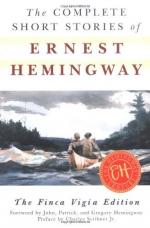|
This section contains 2,376 words (approx. 8 pages at 300 words per page) |

|
SOURCE: Freedman, Morris. “Disparaging Hemingway.” Virginia Quarterly Review 77, no. 1 (winter 2001): 76-82.
In the essay below, Freedman speculates to what extent the media's fascination with and exploitation of the cult of personality in the case of Hemingway affects considerations of his writing and whether or not this may be justified.
In introducing his less than admiring review of Ernest Hemingway's Across the River and Into the Trees, in The New York Times Book Review, John O'Hara referred to him as the greatest writer since Shakespeare. O'Hara wasn't simply being contrarian; I'm sure he could have reasonably justified the hyperbole. As a fellow professional writer, he understood that if Hemingway had not written much that was indifferent or inferior, like the book under scrutiny, as Shakespeare and O'Hara himself had done, Hemingway might not have written so much that was great.
O'Hara's intent was certainly not to set Hemingway up...
|
This section contains 2,376 words (approx. 8 pages at 300 words per page) |

|


